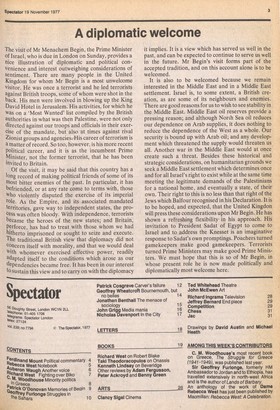A diplomatic welcome
The visit of Mr Menachem Begin, the Prime Minister of Israel, who is due in London on Sunday, provides a nice illustration of diplomatic and political convenience and interest outweighing considerations of sentiment. There are many people in the United Kingdom for whom Mr Begin is a most unwelcome visitor. He was once a terrorist and he led terrorists against British troops, some of whom were shot in the back. His men were involved in blowing up the King David Hotel in Jerusalem. His activities, for which he was on a 'Most Wanted' list compiled by the British authorities in what was then Palestine, were not only directed against our troops and officials in their exercise of the mandate, but also at times against rival Zionist groups and agencies. His career of terrorism is a matter of record. So too, however, is his more recent Political career, and it is as the incumbent Prime Minister, not the former terrorist, that he has been invited to Britain.
Of the visit, it may be said that this country has a long record of making political friends of some of its most bitter enemies of the past. In particular, it has befriended, or at any rate come to terms with, those Who violently disputed the exercise of its imperial role. As the Empire, and its associated mandated territories, gave way to independent states, the process was often bloody. With independence, terrorists became the heroes of the new states; and Britain, Perforce, has had to treat with those whom we had hitherto imprisoned or sought to seize and execute. The traditional British view that diplomacy did not Concern itself with morality, and that we would deal With whomever exercised effective power, readily adapted itself to the conditions which arose as our dependencies became free. It has been in our interest to sustain this view and to carry on with the diplomacy
it implies. It is a view which has served us well in the past, and can be expected to continue to serve us well in the future. Mr Begin's visit forms part of the accepted tradition, and on this account alone is to be welcomed.
It is also to be welcomed because we remain interested in the Middle East and in a Middle East settlement. Israel is, to some extent, a British creation, as are some of its neighbours and enemies. There are good reasons for us to wish to see stability in the Middle East. Middle East oil reserves provide a pressing reason; and although Norih Sea oil reduces our dependence on Arab supplies, it does nothing to reduce the dependence of the West as a whole. Our security is bound up with Arab oil; and any development which threatened the supply would threaten us all. Another war in the Middle East would at once create such a threat. Besides these historical and strategic considerations, on humanitarian grounds we seek a Middle East settlement which determines once and for all Israel's right to exist while at the same time meeting the legitimate demands of the Palestinians for a national home, and eventually a state, of their own. Their right to this is no less than that right of the Jews which Balfour recognised in his Declaration. It is to be hoped, and expected, that the United Kingdon will press these considerations upon Mr Begin. He has shown a refreshing flexibility in his approach. His invitation to President Sadat of Egypt to come to Israel and to address the Knesset is an imaginative response to Sadat's own promptings. Poachers turned gamekeepers make good gamekeepers. Terrorists turned Prime Ministers may make good Prime Ministers. We must hope that this is so of Mr Begin, in whose present role he is now made politically and diplomatically most welcome here.


































 Previous page
Previous page